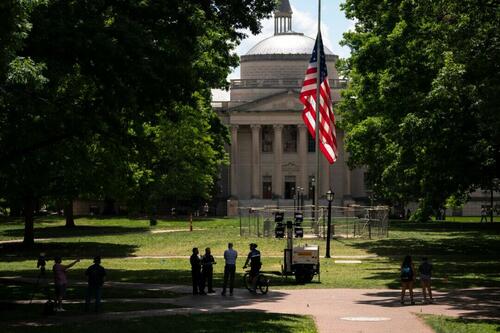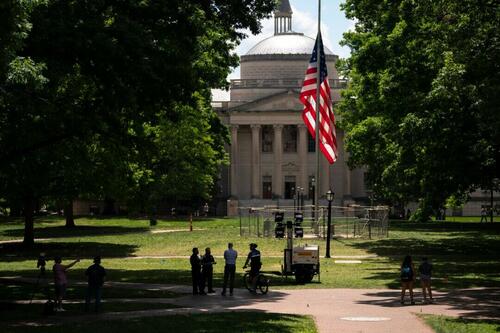
UNC Chapel Hill Trustees Vote To Redirect DEI Money To Campus Safety
Authored by Bill Pan via The Epoch Times (emphasis ours),
The board of trustees of the University of North Carolina at Chapel Hill has unanimously voted to defund diversity, equity, and inclusion (DEI) programs and instead use the millions of dollars to boost campus safety.
 A barricade protects the American flag at Polk Place at the University of North Carolina in Chapel Hill, N.C., on May 1, 2024. (Sean Rayford/Getty Images)
A barricade protects the American flag at Polk Place at the University of North Carolina in Chapel Hill, N.C., on May 1, 2024. (Sean Rayford/Getty Images)At a special meeting on Monday morning to discuss budget plans, the board voted to divert the $2.3 million the university invests in DEI programs toward police and other public safety measures. The public university had an operating budget totaling more than $4 billion in the previous fiscal year.
“I think that DEI, in a lot of people’s mind, is divisiveness, exclusion, and indoctrination,” Marty Kotis, vice chair of the board’s budget and finance committee, said during Monday’s meeting. “We need more unity and togetherness, more dialogue, more diversity of thought.”
Mr. Kotis moved on to make the case for using the freed-up DEI dollars to improve campus security, highlighting the vandalizing of an administrative building by pro-Palestinian protesters just hours before the commencement ceremony on Saturday, May 11.
According to photos shared on social media by student newspaper the Daily Tar Heel, protesters defaced Chapel Hill’s South Building with red paint and chalk, leaving red handprints and messages saying “You Support Genocide” and “UNC Has Blood on Its Hands.”
The steps of the building were also covered in red paint, which has since been power-washed off.
“When you have warring groups or dividing groups, they can hurt each other, they can damage property like they did here in the South Building—red paint everywhere, stickers everywhere, things torn up,” Mr. Kotis told fellow board members. “Law enforcement is then forced to react to that. They do not have all the tools they need right now to keep the campus safe from a large threat.”
“It’s important to consider the needs of all 30,000 students, not just 100 or so that may want to disrupt the university’s operations,” he continued. “It takes away resources from us.”
Recent Campus Incidents
Saturday’s vandalism marked the latest incident in a series of pro-Palestinian demonstrations that have roiled UNC’s flagship campus in recent weeks and lead to dozens of arrests. On April 30, more than 30 protesters were detained for trespassing after they tore down barricades outside the campus’ main quad and took down the American flag on a flag pole to replace it with Palestinian colors.
Twenty of those individuals were unaffiliated with the university.
“When you destroy property or you take down the U.S flag and you have to put up gates around it—that costs money,” Mr. Kotis said at the budget meeting. “It’s imperative that we have the proper resources for law enforcement to protect the campus.”
The proposed diversion of funds would also help keep Chapel Hill align with existing state law, as well as a new equality and nondiscrimination policy that could lead to the elimination of DEI positions across all 17 UNC institutions—16 public universities and a public boarding high school, the North Carolina School of Science and Mathematics.
The new policy, adopted April 17 by the UNC Board of Governors’ Committee on University Governance, replaces a 2019 policy that created DEI offices and implemented reporting requirements across the system.
Under the current DEI policy, all institutions within the system are required to employ at least one senior-level administrator who is tasked to oversee “policy development and strategic planning to promote and advance” diversity and inclusion goals.
The new policy’s wording indicates that those DEI positions do not “adhere to and comply with the strictures of institutional neutrality” as outlined in North Carolina law that prohibits public colleges and universities from participating in “political controversies of the day.”
The same policy change will be voted on in a full Board of Governors meeting next week.
If approved, the policy will be effective immediately and individual university chancellors will need to submit a report by September detailing their plans to comply with the institutional neutrality mandate. That includes reporting any “reductions in force and spending, along with changes to job titles and position descriptions undertaken as a result of implementing” the policy, and how those savings achieved from these actions can be “redirected to initiatives related to student success and wellbeing.”
Tyler Durden
Tue, 05/14/2024 – 06:30













